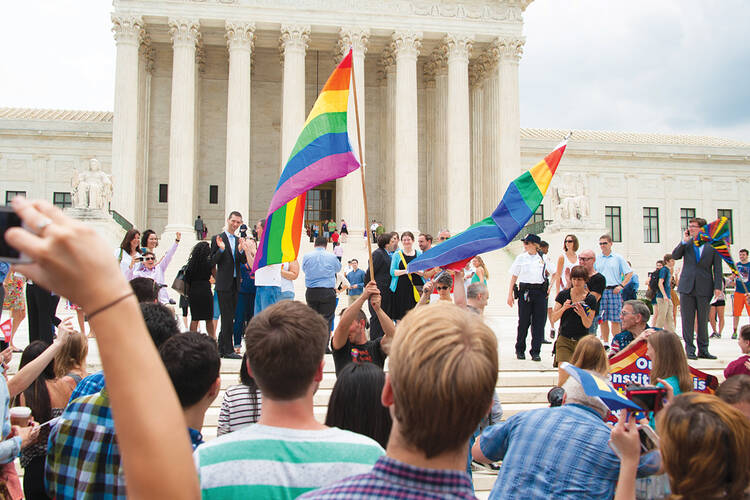President Obama’s signature legislation, the Affordable Care Act, survived a Supreme Court challenge on June 25 in a 6-to-3 decision. “Congress passed the Affordable Care Act to improve health insurance markets, not to destroy them,” Chief Justice John Roberts argued for the majority in King v. Burwell, ruling that the federal government may provide tax subsidies to help people buy health insurance even in states that refuse to set up insurance exchanges under the law. “We must respect the role of the Legislature, and take care not to undo what it has done,” Roberts wrote.
This was just one of a number of significant decisions in recent weeks on matters of concern to U.S. Catholics. On June 26, the court ruled 5 to 4 that same-sex couples are entitled to the same marital rights as heterosexual couples. Justice Anthony Kennedy’s sweeping decision in Obergefell v. Hodges invalidates all state constitutional and statutory defense of marriage provisions and requires marriage licenses to be issued without regard to sexual identity.
That ruling was deplored by Catholic bishops around the country, beginning with the president of the U.S. Conference of Catholic Bishops, Archbishop Joseph Kurtz of Louisville, Ky., who called the decision a “tragic error.”
Citing the Dred Scott and Roe v. Wade decisions, Archbishop Thomas Wenski of Miami said, “Bad decisions lead to bad consequences and do not ‘settle’ anything.” He added, “This decision redefining marriage will also bring bad consequences.”
Analyzing the practical ramifications for the church at the national, state and local levels will take time, said Archbishop William E. Lori of Baltimore. It has implications for “hundreds, if not thousands” of laws at all levels.There is “a difficult road ahead for people of faith,” he said.
A few bishops’ statements attempted to accompany disappointment at the court’s decision on same-sex marriage with deference to the sensibilities of the nation’s gay and lesbian community. Archbishop John Wester of Santa Fe wrote, “As Catholics, we seek to uphold our traditional belief in marriage as a sacrament, a well established and divinely revealed covenant between one man and one woman, a permanent and exclusive bond meant to provide a nurturing environment for children and the fundamental building block to a just society.”
He added, “At the same time, we respect the dignity of all persons, not wishing to undermine their pursuit of happiness but only to preserve and defend the gift of marriage as divinely revealed in Scripture and in natural law.”
Archbishop Blase Cupich of Chicago said, “It is important to note that the Catholic Church has an abiding concern for the dignity of gay persons,” citing the Catechism of the Catholic Church, which instructs that gay and lesbian people “must be accepted with respect, compassion, and sensitivity” (No. 2358).
“This respect must be real, not rhetorical,” said Archbishop Cupich, “and ever reflective of the church’s commitment to accompanying all people. For this reason, the church must extend support to all families, no matter their circumstances, recognizing that we are all relatives, journeying through life under the careful watch of a loving God.”
In Glossip v. Gross, another bitterly divided end-of-term case, the Supreme Court on June 29 upheld the execution protocol used by Oklahoma and several other states. In a 5-to-4 ruling, Justice Samuel Alito upheld lower courts that said the use of the drug midazolam in lethal injection does not violate Eighth Amendment protections against cruel and unusual punishment.
The majority opinion noted that the constitutionality of the death penalty has been previously established and only delved into whether the claims by Oklahoma death-row inmates that the effects of the drugs used in lethal injection were unnecessarily painful.
In a dissenting opinion, Justices Stephen Breyer and Ruth Bader Ginsburg called for briefings on whether the death penalty itself ought to be ruled unconstitutional. “I believe it highly likely that the death penalty violates the Eighth Amendment,” Breyer wrote. “At the very least, the court should call for full briefing on the basic question.”








